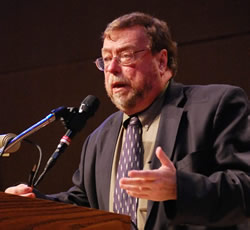 |
The Schiller Institute's
|
Wayne Madsen
The NSA Collects It All; Shut It Down!

Wayne Madsen. |
Wayne Madsen is an investigative journalist, author, and columnist; he served as an officer in the Navy, and worked briefly for the NSA. He is a senior fellow with the Electronic Privacy Information Center (EPIC), and has been in the forefront of fighting to expose and to tear down the massive surveillance state.
It’s kind of serendipitous: I arrived here in New York last night, while en route from spending the last week at both the Dwight Eisenhower and Harry S. Truman Presidential libraries, where I was doing research in the early days of our national security state.
Now, they’ve been experiencing a lot of earthquakes in the Midwest, and some have been attributed to fracking. I actually believe that some of them are probably a result of both those gentlemen, Presidents Truman and Eisenhower, spinning in their graves over what has become of the Cold War instruments that Truman created, and Eisenhower, of course, built up on. The CIA was created in 1947; the NSA was created in 1952.
The revelations of Edward Snowden, of course, were shocking to a lot of people, but to a lot of us who have followed the NSA’s history, since about the early ’90s, late ’80s, it really wasn’t a surprise. When I worked at NSA in the mid-’80s, I started hearing the term used by several NSA engineers working in signals intelligence—they were talking about “total hearability.” Now, I even had to look up that word, “hearability,” in a dictionary: It didn’t exist! It didn’t exist. But this was the day when NSA was basically in an analog world, listening to all kinds of communications over the phone, telemetry, etc., etc., a lot of it radiofrequency spectrum, not on fiber optic cables as we see data transmitted today.
So that was their intention: “total hearability.” They wanted to hear everything.
Then we came into the ’90s, the end of the Bush 41 Administration, the Clinton Administration, and the NSA had a new program where they said, look, we know people are encrypting their information, but the NSA needs to have access to it. So they came up with something called key escrow encryption; it had various names, “Clipper Chip,” “Capstone Chip,” one I especially liked was “tessera.” The tessera was a tile worn by Roman slaves, to identify themselves to the Roman authorities as slaves. I mean, the NSA, I don’t know who their PR people are when they roll these things out, but that certainly wasn’t met with any great favor by those of us in the privacy community.
I think one of the funniest programs: The NSA says that they develop these names of these various systems, because they have a master book they go to. As a result of the Snowden revelations—I had to laugh at one called “Egotistical Giraffe.” And I just remember some of the tall, lanky people I worked with at the NSA! And the one that was used to spy on the Mexican President was called “White Tamale,” and we’re supposed to believe that was just happenstance that they came up with that term?
So the Clipper Chip created probably the first firestorm as far as the public’s view of the NSA, offering the public these new gifts, of key escrow.
The All-Seeing Eye
Then we had, of course, 9/11. But even before 9/11, we know that the NSA, the minute the Bush Administration came into power in that fraudulent election of 2000, they already were pressuring telephone companies, telcos, to give them access to their data switches: AT&T, Verizon; one in particular refused, Qwest, and their CEO went to prison on some trumped-up, inside trading accusations. He was convicted, and spent some time in jail. I think he’d be the first to tell you that that was a political prosecution because he wasn’t going to play with the NSA.
Then we saw something develop called the “Total Information Awareness” program; that was done in DARPA, Defense Advanced Research Projects Agency. So who did they haul out to head up that program? A guy named John Poindexter. Admiral Poindexter, one of the perpetrators of the greatest government conspiracy since Watergate, the Iran-Contra scandal, and they put him in charge. And people in the administration said, “We’re accused of all kinds of conspiracy theories, these are not true.” So why did they get one of the conspirators in Iran-Contra to head up Total Information Awareness? They talk about “conspiracy theories”—the logo for that program was the pyramid with the all-seeing eye, looking down the planet! And they said people that complain about that are conspiracy theorists!
When the 9/11 Commission [was created], for the first time, I was approached by whistleblowers. Now, I had worked at the NSA. The idea of a whistleblower there was just unheard of! We had spies in the ’80s, we had the Raymond Pelton case and the Walker spy ring, but to have whistleblowers come forward, not because they wanted to expose secrets, but they wanted to expose wrongdoing! And this was shocking to me. And I said, things must really be bad at the NSA, for this to happen.
So how were these people dealt with? They were talking about warrantless wiretapping, Stellar Wind, you’ve seen some on TV, even before the revelations of Snowden; Russ Tice, there was Tom Drake. In the Justice Department, Thomas Tamm was a Justice Department prosecutor. All these people were basically hauled in to answer questions; some went before grand juries; the FBI wanted to charge them. We saw this administration, the Obama Administration, charge eight to nine people under the Espionage Act of 1917! Obama has done more prosecutions under that act than all of his predecessors combined, just to silence whistleblowers!
And then we heard kind of a takeoff on “total hearabilty”: “collect it all.” the NSA’s mission is to “collect it all.”
The Snowden Revelations
Then we had the Snowden revelations. The most important thing about the Snowden revelations—we knew they were doing this, we knew they were surveilling journalists: I wrote about a program called “First Fruits” that was collecting not only what journalists were writing about the NSA, but who they were talking to on the telephone—so they were mixing signals intelligence intercepts on our communications and then putting it in their database.
What Snowden showed us was how they’re doing it. We knew they were doing it, but he gave us the technical document showing how they were doing this surveillance, and this is across the board. We now have what’s called SIGADs, Signal Intelligence Activity Descriptors; their nomenclatures used to be for the NSA stations, like Menwith Hill [U.K.], like Masawa, Japan. Now they have SIGADs for AT&T and Verizon switches in this country! Also for Yahoo, for Google, for PayPal. And you know, this group that Pierre Omidyar founded, PayPal, gives $100 million to [Glenn] Greenwald and some other journalist to write about the NSA. I believe the real reason for that, is that he didn’t want information coming out that PayPal is a major supporter of NSA surveillance. So how do you silence that? You buy off some journalists with $100 million—it might work! I didn’t get my offer, yet. I’m a little upset about that!
We also heard from Snowden about the third parties to the NSA surveillance. (The second parties are the English-speaking countries: Canada, Australia, New Zealand, Britain, United States.) [German Chancellor] Angela Merkel expressed total surprise when she found out her “handi,” her cell phone, was being listened in on by the NSA! But did she bother to go to the Bundesnachrichtendienst [BND], her Federal intelligence service, to find out? Yes, we’re cooperating with the NSA in that program, and we’ve been listening to all your communications! I likened her to the Inspector in the movie, “Casablanca,” Inspector Reynaud, when he says, “I’m shocked to find gambling in this establishment”—and then he’s handed his winnings.
Okay, the NSA, they are collecting it all. You play online games, you surf porno sites, they’re in there, they’re using this information. It’s across the board; there is no such thing as privacy in this world of the NSA.
We know about tailored access operations, introducing viruses, malware, a lot of the spam you get is the NSA—they’re involved with that. As far as them monitoring world leaders, well, that’s actually in their charter; they’ve been doing that for years. And if the world leaders—I think the world leaders are upset because they thought they were immune to this, because we’re “leaders.” We’re the G20—how can we be listened in on by the NSA? When you’re a target of the NSA, there’s no safe harbor.
What Can Be Done?
Now, in closing, because I know we want time for questions, I just want to say: What can be done? There’s a lot of people who say, look, Obama, he had some internal reports, let’s modify what the NSA does; let’s restrict them. Let’s reimpose the Foreign Intelligence Surveillance Act requirements.
My feeling on the NSA: It’s an out-of-control intelligence agency. End it, don’t mend it. Get rid of it! When the Shah was overthrown, they didn’t mend SAVAK, they got rid of SAVAK. When apartheid in South Africa fell, they didn’t mend the Bureau of State Security (BOSS), they got rid of it. They got rid of the KGB; they got rid of the Stasi; they got rid of the Securitate in Romania; they got rid of the State Research Bureau, after they got rid of Idi Amin; they got rid of Tonton Macoute in Haiti, when they got rid of Baby Doc. So, let’s get rid of the NSA.
You can take that facility. It’s a wonderful facility campus they have. We have a shortage of engineers and scientists in this country, and it would make a wonderful training center for engineers, vocational/technical people, and with all those unemployed NSA people, they’ll still have jobs: They can teach mathematics and engineering to all these people that need that training. Or it can be just the University of Maryland Columbia Campus.
Anyway, it was interesting to read through the papers of Eisenhower and Truman. I have to say, if they were around today, they would also agree with me, that what you do with the NSA, what it has become, you have to end it, don’t mend it.
Thank you very much.
